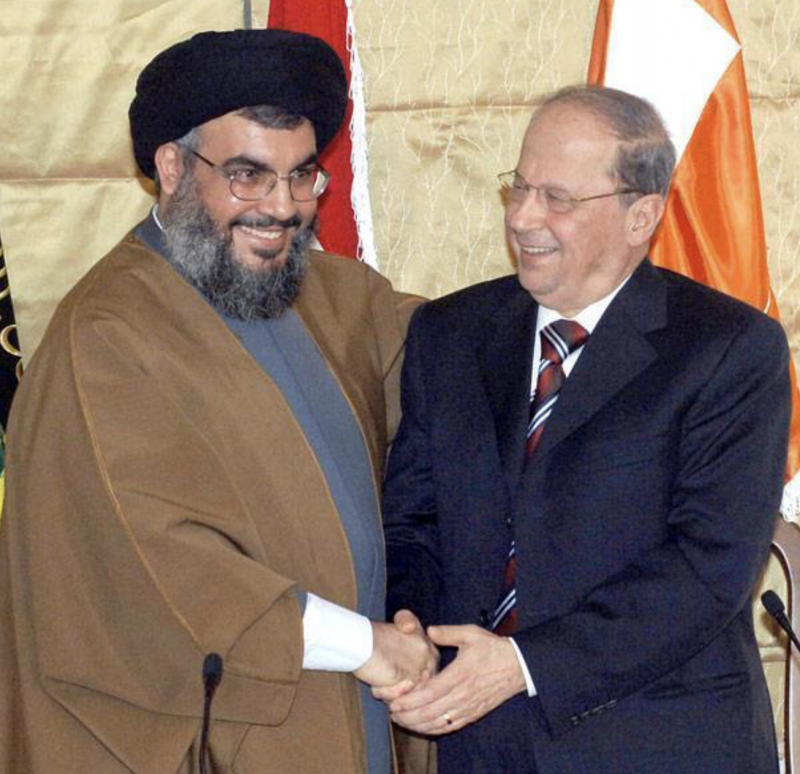
Hezbollah Secretary General Hassan Nasrallah and former CPL President and founder Michel Aoun. (Credit: Archives/L'Orient-Le Jour)
Feb. 6 marked the 18th anniversary of the Mar Mikhael agreement between the Free Patriotic Movement (FPM), founded by former President Michel Aoun, and Hezbollah.
Despite their intermittent relations over the years, the two parties have never appeared as estranged as they do today, with their agreement seemingly teetering on the brink.
Before he departed from the presidential palace, Aoun directed criticism at Hezbollah leader Hassan Nasrallah, accusing him of prioritizing the interests of Parliament Speaker Nabih Berri over their accord.
Efforts to reconcile their differences through several dialogues have proven fruitless.
While Berri was the sole shadow in the lengthy years of their alliance, new obstacles have emerged between the FPM and Hezbollah.
This includes Hezbollah’s endorsement of Marada leader Sleiman Frangieh’s presidential candidacy.
Additionally, there was its approval for the extension of the term of office for Army Chief Joseph Aoun and the armed conflict with Israel in the south, in the aftermath of Hamas’ Oct.7 attack.
Here’s the revised version with direct and indirect speech separated.
“We are not bound to Gaza by a defense treaty,” said Aoun, who has long upheld Hezbollah’s signature slogan, “army, people, resistance,” and defended the July 2006 war between the party and Israel. At the time, the two sides maintained excellent ties, with Aoun eyeing the presidency. He had to wait 10 years to take office backed by Hezbollah.
“It is the Arab League that can unite the fronts. To say that participating in the war is a preventive act against any Israeli aggression is simply a point of view because entering into this confrontation does not avert the danger and may even increase it,” he added in a televised interview on Monday.
Aoun went on to say that Lebanon’s sovereignty and independence belong to its people and cannot under any circumstances be bargained away, even partially. According to him, part of the Lebanese people has made its choice to refuse to be drawn into the war and the government is incapable of taking a stand.
“The victory is that of a country and not of a single party,” Aoun said. “Translating developments in Gaza and south Lebanon into some kind of presidential bargain runs counter to sovereignty; it would be the biggest loss for the country,” he added.
The presidential vacuum has persisted since the end of Aoun’s term. The former president wants to ensure that only the person he deems worthy succeeds him.
His son-in-law and current FPM leader Gebran Bassil echoed this sentiment.
Following Aoun’s televised interview on Monday, Bassil held a press conference where he rejected Lebanon’s involvement in the liberation of Palestine.
“We oppose the unity of fronts, particularly linking the cessation of hostilities in south Lebanon to the end of the conflict in Gaza,” he stated. Bassil even cautioned Hezbollah, albeit indirectly, asserting that it would bear sole responsibility for any war it initiates.
Genuine change of heart or another blackmail attempt?
The FPM rebellion against Hezbollah is not new. It had been simply stifled.
For both Aoun and Bassil, Hezbollah seems to forget the FPM support over the years, while other political stakeholders were at odds with it.
The FPM provided Hezbollah with unwavering Christian political cover during the party’s actions in May 2008, when its operatives seized control of part of the capital in Lebanon. Three years later, Hezbollah also decided to fight alongside Syrian President Bashar al-Assad’s regime.
For many FPM supporters, Aoun’s six-year term had been marred by setbacks because of his support for Hezbollah.
Moreover, it’s Hezbollah’s influence that caused Bassil to face US sanctions.
Despite these challenges, the Mar Mikhail agreement has endured, albeit with some scars.
Today, the FPM appears reluctant to pick up the pieces, and perhaps it’s no longer in a position to do so.
Increasingly isolated within the Christian community and even among its members and supporters, the FPM struggles to justify its alliance with Hezbollah.
Initially envisioned as a limited-time and limited-scope conflict, the ongoing escalation poses a growing challenge for both Hezbollah and its Christian allies. As Israel escalates and Hezbollah is forced to respond, the FPM is losing its political capital.
While Bassil has been outspoken for some time, Aoun, usually a mediator between Hezbollah and the FPM, has never been so openly opposed to Hezbollah’s actions.
These stances appear to stem from a significant political reassessment underway within the FPM, which is fighting for its political survival.
The FPM’s declining popularity within the Christian community, evident in recent elections, coupled with its alienation from the Sunni community during its tenure, presents a formidable challenge. Former Prime Minister and Sunni leader Saad Hariri recently characterized his support for Aoun’s presidency in 2016 as a “mistake.”
Aoun’s acknowledgment of the Arab League’s role was deliberate.
Initiating his six-year term with a visit to Saudi Arabia, Aoun now recognizes the imperative to mend the fractures — primarily instigated by his pro-Iranian ally — within the Gulf states.
Will this reassessment lead to divorce? The FPM must commit fully if it seeks real change. Is it prepared to reject Hezbollah’s control over military decisions and its monopoly on war and peace?
Could it advocate for the deployment of the national army along the southern border? Or is this upheaval merely a plea for assistance and a call for reconciliation?
It’s not a lack of impulsivity but rather a lack of leeway that constrains both Aoun and Bassil.
When asked about the impact of his discord with Hezbollah on the presidential election, Aoun responded, “We won’t commit suicide.”
The real question is, which option would prove fatal for the FPM?
This article was originally published in L'Orient-Le Jour. Translated by Sahar Ghoussoub.